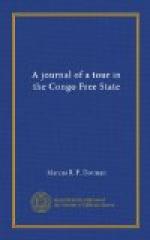The natives here seem to have been spoilt by the whites who must have given them very high prices for food at first, and these have never been reduced. Naturally demand and supply affect the price considerably. A native refused to sell us a duck at Coquilhatville for 14/-, for ducks are rare. On the other hand in remote villages rarely visited by white men, the people will sometimes give two chickens for an empty wine bottle and would practically sell themselves for salt so fond are they of that substance. This they eat alone and relish immensely for the native salt is very unpleasant. It is made from water lilies and certain forms of grass which are burnt slowly under a fire, the resulting ash containing a large quantity of sodium chloride. It is however, mixed with sulphur, charcoal and other impurities and to remove these the ash is placed in water when the sodium chloride and other soluble salts enter into solution. This is then evaporated to dryness in the sun and forms native salt.
Once clear of the line of villages which extend for two or three miles, the path enters dense forest and the walk becomes pleasant. Palms are abundant and the parasol. tree very common. Overhead are pigeons, a few ducks and, as usual, thousands of parrots. I shot a few either for the larder or for their skins all of which fell in the dense undergrowth. Without a retriever these were no doubt difficult to find but it was curious that the birds with beautiful feathers and indifferent flesh were always picked up while the ducks and pigeons usually could not be found. All the porters returned along this path the next day and perhaps were then more successful and enjoyed the game which would not be harmed by hanging for a day in a tree. The road is a good one being sometimes five or six feet wide and most of the marshes and streams are crossed by rude wooden bridges formed by trunks of trees laid parallel to each other.
[Illustration: WARRIORS AT DJABIR.]
Most of the way is up a gentle incline for we are now passing over the ridge which separates the watersheds of the Ubangi and the Congo. At intervals along the road are small clearings in some of which are capitas armed with cap-guns to protect the rubber caravans from thieves. About midday we reach Kaki-kaki, a clearing in the forest in which is a mud house for the use of white men passing through and here I call a halt for we have marched about twelve or thirteen miles.
On again next morning at daybreak the path continuing through the forest, and as it is quite cold at this hour and the exercise is pleasant we march briskly only stopping to shoot occasionally. After leaving Kaki-kaki the streams flow south instead of north which shows that after fighting our way up rivers for four months we have now reached the highest point of our journey and are at length going down hill.




